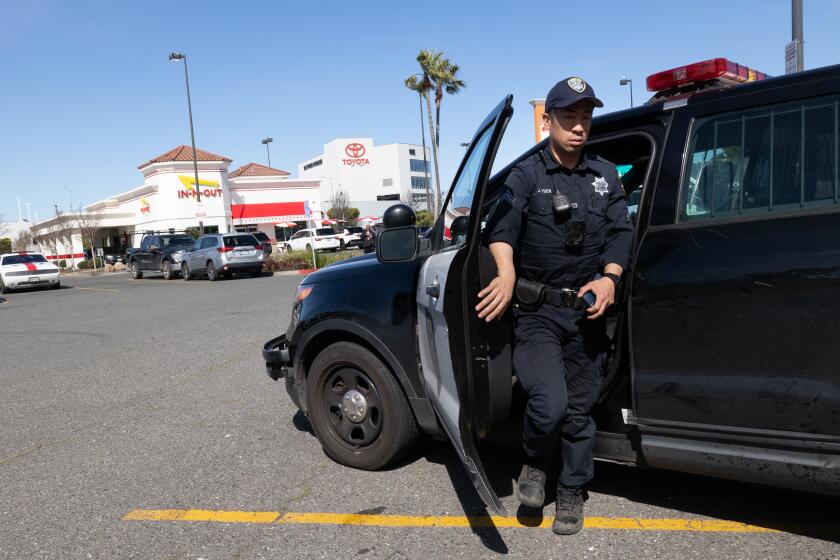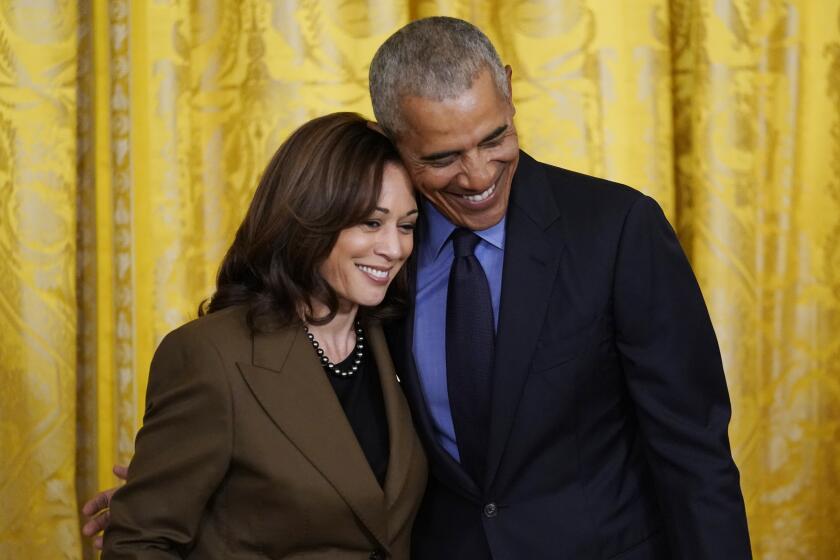4 Oil Companies Agree to Settle Antitrust Suit
In what officials called the largest antitrust settlement in state history, four major oil companies agreed to pay $220 million in cash and other rights to withdraw from a longstanding lawsuit alleging that they conspired to fix the price of oil pumped in Long Beach, state officials said Friday.
Without admitting wrongdoing, Chevron Corp., Shell Oil Co., Texaco Inc. and Mobil Corp. each agreed to pay the state $45 million in cash next month to be dropped from the 16-year-old suit brought by the state and the city of Long Beach.
In addition, the companies agreed to turn over their private, unheated oil pipelines for use as common carrier lines, a move that the state estimated would result in an additional $40 million in oil revenue flowing to state coffers.
At a news conference near Los Angeles International Airport, Lt. Gov. Leo T. McCarthy called on Gov. Pete Wilson and state legislators to use part of the money to roll back tuition increases at state-run universities and to hire back teachers furloughed from Los Angeles schools.
The proposed settlement--which must be approved by Wilson, Long Beach and state and federal courts--would eliminate all but one oil company, Exxon Corp., from a suit that originally named seven firms. Earlier, Unocal Corp. and Atlantic Richfield Co. settled their portions of the case for a total of $99.5 million in cash and other benefits.
“This settlement shows that four major oil companies do realize the significance of the concept of corporate responsibility,” McCarthy said Friday. “The people of California deserve to be treated respectfully as customers. They didn’t deserve to be treated as targets for fleecing.”
The suit alleges that the companies met secretly, conspiring to pay artificially low prices for oil pumped in the 1970s and early 1980s, and thus cheated Long Beach and the state out of hundreds of millions of dollars in royalty revenues.
“Our message to the oil companies is very simple: We aren’t going away,” said state Controller Gray Davis, a member of the State Lands Commission, which is a plaintiff in the suit. “We aren’t giving up. And if you rip off California consumers, ultimately the scales of justice are going to be balanced.”
Spokesmen for the four oil companies steadfastly denied that they conspired to fix oil prices or that their companies committed any wrongdoing.
“This is yet another example of lawsuits being filed for such exorbitant amounts that innocent companies have no prudent alternative but to pay what is in effect legal ransom,” Chevron Chairman Kenneth Derr said Friday.
The other companies expressed similar sentiments.
McCarthy and Davis blasted Exxon for not settling, and McCarthy vowed to press on against Exxon in court. If Exxon loses, it faces triple damages and tax liabilities amounting to $500 million, lawyers for Long Beach said.
“You would have thought that after the Valdez spill, Exxon . . . would have made some serious attempt to reach a settlement to try to repair its own public image,” McCarthy said, invoking the disastrous 1989 Alaskan oil spill. “I’m very disappointed personally that they haven’t yet figured out just how much trouble they’re in with the public they want as customers.”
He added that Exxon fought unsuccessfully in a court hearing Friday to extend a gag order on the proposed settlement.
In Houston, Exxon spokesman Les Rogers said the company refused to settle “because we did not do what the plaintiffs are claiming. . . . Exxon has never been aware of any conspiracy to fix prices of California crude oil.”
Rogers added that the company was prepared to fight the charges in court: “We are confident we will prevail.”
The suit, filed in 1975, concerns the 1.5-million-barrel Wilmington oil field. In the 1960s, Long Beach sold the major oil firms the right to pump crude from the field.
The case was dismissed in 1985 by a U.S. District Court judge, but was reinstated in 1989 by an appeals court. In 1990, the U.S. Supreme Court returned the case to District Court for trial, which is scheduled to begin with jury selection Sept. 3.
So far, the state and Long Beach have spent $55 million to $60 million to press the lawsuit. Friday’s proposed agreement raises the total amount of settlements to $319.5 million, officials said.
McCarthy said the $220 million involved in the settlement announced Friday should be put “where it will do the most good.”
Specifically, he said $96 million should be used to roll back recent tuition increases of 40% in the University of California system and 20% in the California State University system. In addition, he proposed that $33 million go to the Los Angeles Unified School District to rehire 800 teachers and other staff laid off this week because of budget constraints. The rest of the money should go to other school districts, he said.
On Friday, Davis cited a Chevron Corp. memo in 1961 that he claimed was evidence of the conspiracy.
“Currently, heavier crudes in California are priced at a level less than their true refining values,” the memo read. “If it became generally recognized throughout the industry that these crudes were underpriced, this could create considerable unfavorable reaction, which might ultimately lead to legal action against segments of the oil industry.”
Robert Mittelstaedt, a lawyer for Chevron, denied that the memo provided any evidence of a conspiracy. The memo, he noted, is dated before the time period of the lawsuit and does not mention any other oil companies. It refers to “true refining values”--not posted crude oil prices, which were the basis of the company’s contract with Long Beach, he said.
Mittelstaedt added: “The city and the state have agreed to settle this lawsuit. If they want to try this case in public and trot out documents here and there, then we’re prepared to try this case in court.”
NEXT STEP
Jury selection will begin Sept. 3 in U.S. District Court in Los Angeles in the state’s lawsuit against Exxon Corp., the remaining oil company defendant in the longstanding royalty dispute. The portion of the suit to be tried next month alleges price-fixing in the 1960s and 1970s. A second part of the suit, alleging price-fixing in the 1980s, is pending in state court, but no trial date has been set. Meanwhile, the state’s $220-million settlement with four other oil companies must still be approved by the State Lands Commission, Atty. Gen. Dan Lungren, Gov. Pete Wilson, the Long Beach City Council and state and federal courts. After that, parties to the agreement will return to court to decide the fate of three heated oil pipelines that were not converted to common carrier status by the settlement.
More to Read
Sign up for Essential California
The most important California stories and recommendations in your inbox every morning.
You may occasionally receive promotional content from the Los Angeles Times.






